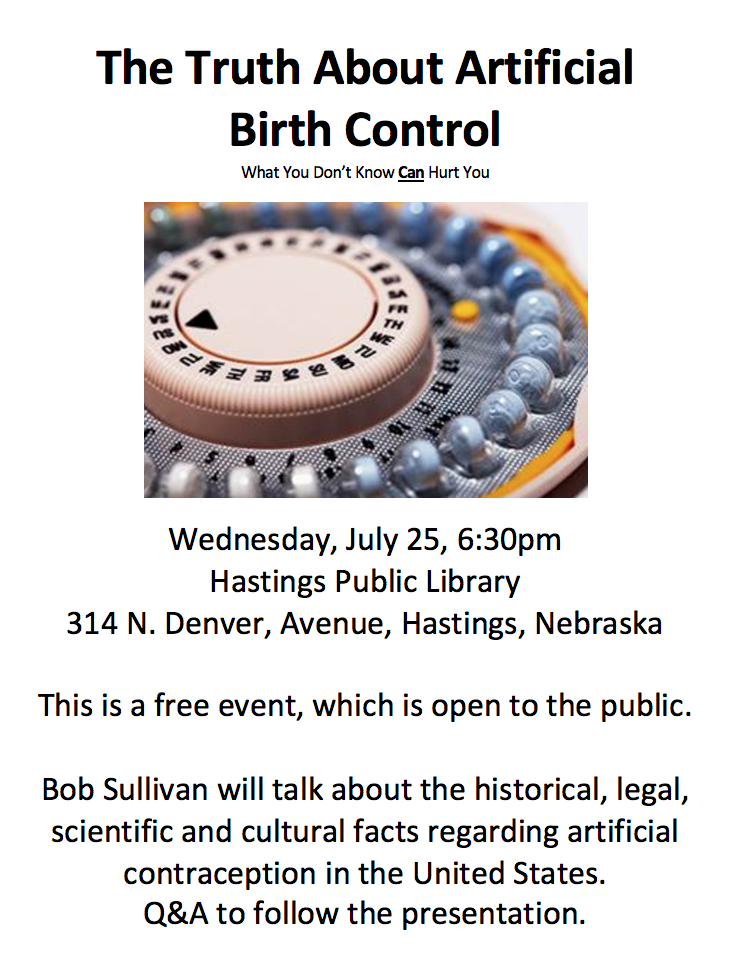What You Should Know About Hormonal Birth Control
Handout for:
What You Should Know
About Hormonal birth control
July 25, 2018
Hastings Public Library
By Bob Sullivan
In April, 2018, a citizen of Hastings penned a letter to the editor of the Hastings Tribune, stating that there are too many people polluting the planet. She had decided we should have more contraception and tax parents who have too many children thereby reducing people and pollution.
Since her hypothesis was saving the planet, I responded with a letter pointing out that hormones have been leaching into our drinking water, causing a lot of environmental problems and health concerns for the general public. I also mentioned that birth control has not really solved any of our cultural problems either. If we really wanted to protect our environment, we should stop putting hormones into our bodies in the form contraception which then ends up in our drinking water.
Another citizen responded to my letter, stating that the real problem are the hormones the agricultural industry which injects hormones into our livestock.
While Writer #2 may have a point, the hormones remain the cause of this problem, so why would we put extremely high doses directly into our young women in the form of birth control? If hormones should not go into animals because we then consume trace amounts of those hormones in our food and water, why do we allow it in much higher doses for humans?
I then collaborated with some friends of mine who happen to be medical doctors in an effort to provide an even more thorough discussion of the negative effects of contraception. My plan was to provide it to the Hastings Tribune as an Op-Ed. The following paragraphs (with several edits for purposes of the 50th Anniversary of the release of Humanae Vitae) are the Op-Ed, which was submitted to the Tribune in May. The Tribune has not yet published it and I don’t expect it will get published. Because of that, I am providing it here:
_________________________________________________________________________
Until 1965, the medical and scientific fields agreed that pregnancy (and therefore, life) begins at fertilization a.k.a conception. Fertilization and conception are simply different words for the exact same thing. Fertilization happens when a sperm unites with the egg. At that point, the two become one. It is at fertilization that the new human being receives its own DNA and the sex of the person is determined.
Medical and scientific professionals knew that oral contraception, by its primary action of preventing release of the egg from the ovary during a women’s fertility cycle, would fail in a certain percentage of cycles even when used consistently by a woman. When the pill fails to prevent the release of the egg, it can prevent the sperm from reaching the egg, but this second way of preventing pregnancy can (and does) fail sometimes as well, resulting in a fertilized egg (now a distinct human life). The third way hormonal contraception works to prevent the birth of a child is to prevent the fertilized egg from implanting into the wall of the uterus. If there is no implantation, the human life dies. Since life begins at fertilization (also known as conception), this causes an early abortion.
Until the Lambeth Conference of the Anglican Church in 1930, all Christian faith traditions denounced contraception as immoral. Several years before this event in England, Margaret Sanger and her supporters, (Margaret Sanger was founder of the American Birth Control League, later known as Planned Parenthood) began to promote artificial contraception, with the publicly unspoken – but privately held knowledge, that legalized abortion would eventually follow. Sanger and her small group of supporters knew the failure rate of the pill and believed that, inevitably, legalized abortion would be necessary to address that issue.
By the late 1950’s, medical and scientific opinion began to promote the understanding that life begins at implantation, not at conception, negating concerns in the public arena about the potential abortifacient property of the contraceptive pill. A new definition of the beginning of life was in the making. Implantation occurs approximately five to seven days after conception. By 1960, the FDA had approved an oral contraceptive for use by American women in the prevention of conception, an effort largely funded by Katherine McCormick, a wealthy backer of Margaret Sanger.
Public sentiment about hormonal contraception began to change in 1965, first in the courtroom, then in the medical field. First, the U.S. Supreme Court entered its decision in Griswold v. Connecticut, declaring birth control legal via prescription for married women. According to the Supreme Court, the right to birth control was found somewhere in the “penumbras” of the Bill of Rights. Apparently, we are to believe that the woman’s right to privacy was hiding in the shadows of the Bill of Rights for 184 years until five judges discovered it.
Due to the Equal Protection Clause, the Griswold Court knew, that by legalizing contraception for married women, they were laying the foundation for legalization of contraception for all women. This occurred in 1972, in Eisenstadt v. Baird.
Three months after the Griswold decision, The American College of Obstetricians and Gynecologists (ACOG) issued a bulletin redefining the term “conception.” The bulletin stated that conception occurred upon “the implantation of a fertilized ovum” in the lining of the uterus and established this as the beginning of pregnancy. Five Judges spoke in a U.S Supreme Court decision, then a group of doctors paved the way for unhindered use of a drug which causes an otherwise healthy body to malfunction by disrupting a woman’s natural fertility cycle.
Science tells us that the contraceptive pill does not always prevent fertilization and not infrequently results in pregnancy. The U.S. has approximately 1.5 million unplanned pregnancies per year in which women used some form of contraception. The Guttmacher Institute says that over 50% of women who have an abortion report using contraception during the month they became pregnant. The Shriver Report says that approximately 43% of these women choose to abort their child. Abortion advocates believe that the ultimate backup plan for failed contraception is induced abortion, not adoption.
Life does begin at fertilization of the egg (a.k.a. conception) with distinct DNA and the determination of the male or female sex. What follows fertilization is the continuum of life, including the development of a baby’s heartbeat 22 days after fertilization, and development of a brain and spinal cord within 4 weeks of fertilization. Face, fingers and toes are developed by 7 weeks after fertilization. None of this development is possible without the beginning: Fertilization, which is the same thing as conception.
Contraception (it translates from its Latin roots “contra” or “against” and “concipere” or “to take in”, “life”) has millions of silent victims each year. Women diagnosed with blood clots, those who wonder if their infertility or cancer is related to their use of hormonal contraception, and all those five to seven-day old humans who have their own DNA and biological sex established but die due to the inability of an embryo to implant in the uterine wall. Contraception’s failure to prevent ovulation can result in an abortion long before anyone, including the mother, knows about the pregnancy. All forms of hormonal contraception including IUD’s, Depo-Provera, Ortho Evra, etc…, and every drug known commonly as “the pill,” secondarily act as abortifacients (a drug or device which causes an abortion) by preventing the fertilized egg (an embryo) from implanting in the wall of the uterus.
As of 2018, there have been over 60 million abortions in the United States since Roe v. Wade. But this only counts the abortions we know about after implantation (procured abortions). This is because clinics and hospitals around the country are required to keep records of procured abortions (and most do). How many millions of abortions have taken place because the chosen method of contraception did not prevent fertilization? This is not an easy question to consider. Widespread use of the pill among Christians, including Catholics, sometimes prescribed by Christian and Catholic doctors and distributed by Christian and Catholic pharmacists requires too much introspection for many.
Contraception is also aggressively marketed to women, including women in their early teens. It is promoted by governments around the world, the pharmaceutical industry, and medicine in general as a basic “good” in society. The marketing has helped to shroud hearts and minds from its destructive effects in family, social life, and the environment. The pill has changed the very fabric of human society with a permeating coldness toward human life and its inherent value. When I point out that we have a problem with hormones in our water, people dismiss the warning and instead point to hormone use in our livestock. A point which is lost is the fact that if introducing hormones into our livestock and our drinking water is not good, how can it be good to put a high concentration of hormones into young women?
I recently wrote a response to a Voice of the People in which I pointed out that the use of hormonal birth control is harmful to our environment. An estimated 150 million women worldwide take birth control pills. The hormones in those pills do not vanish into thin air. Some have questioned the truth of that statement, but a quick internet search will provide a dozen or more news stories about scientific evidence of the problem. It is important to note that these scientific discoveries are downstream from municipal waste-treatment facilities, not downstream from feedlots, farms, or ranches. It is also important to note that some scientists are looking for solutions to the problem. One solution is not to stop using contraception but to pour additional chemicals into our water supply to neutralize the hormones. Chemicals upon chemicals. How environmentally-minded is that plan?
Hormonal contraceptives have many more harmful side-effects which many Americans ignore. I find this strange in a day and age when many of us are so aware of eating organic foods and pursuing natural remedies. Yet our medical providers and pharmaceutical companies recommend that women introduce hormones into their healthy body in order to make their healthy body malfunction. Hormonal birth control increases the risk for blood clots and high blood pressure, heart attack or stroke in women who are in their teens, twenties and thirties, which is much younger than the typical age range for these health problems. There is also a small but significant increased risk for breast cancer, which is a common health risk for women already. There are increased risks for liver cancer, cervical cancer, and other illnesses as well. All of this in addition to the much more common side effects of unwanted hair growth, weight gain, mood swings, and a reduced sex drive. A recent study suggests that many women are diagnosed with depression after going on hormonal birth control (especially for teenagers). Depression has always been a suspected side effect of contraception, but until 2016, nobody told us that for many women, this is a clinical condition which often requires medication and treatment. There is also an increased suicide risk for women who use hormonal birth control. Finally, many people overlook the fact that most if not all forms of contraception provide little or no defense to sexually transmitted diseases (STD’s) at a time when STD’s are occurring at alarming rates in society.
Hormonal contraception is legal and in wide use today due to a change in the definition of the beginning of life and because consumers are not educated about the associated risks to the health of the individual taking the drugs as well as the rest of society due to contamination of drinking water and the detrimental impact it has on relationships, marriage, and family. Hormonal contraception, by its final mode of action (failure of implantation), also causes an early abortion when it fails to prevent ovulation and is responsible for procured abortion when pregnancy does occur during use. All these facts that are true and verifiable. Yet due to marketing, misinformation and the intimidation of medical professionals, many people actually think contraception prevents abortion.
Natural, healthy, and reliable means of birth regulation are available. These natural methods of fertility management protect women, protect the environment and promote intimacy between wife and husband.
On July 25, 1968, Pope Paul VI, released his Encyclical Humanae Vitae (On Human Life). In spite of advice from numerous close advisors, he did not conclude that artificial contraception was a good thing or a necessary evil. He said no human should use it. In paragraph 17 of the Encyclical, he wrote:
“Responsible men can become more deeply convinced of the truth of the doctrine laid down by the Church on this issue if they reflect on the consequences of methods and plans for deliberate birth control. Let them first consider how easily this course of action could open wide the way for marital infidelity and a general lowering of moral standards. Not much experience is needed to be fully aware of human weakness and to understand that human beings-and especially the young, who are so exposed to temptation-need incentives to keep the moral law, and it is an evil thing to make it easy for them to break that law. Another effect that gives cause for alarm is that a man who grows accustomed to the use of contraceptive methods may forget the reverence due to a woman, and, disregarding her physical and emotional equilibrium, reduce her to being a mere instrument for the satisfaction of his own desires, no longer considering her as his partner whom he should surround with care and affection.” [Emphasis added]
Pope Paul VI accurately predicted what would happen once birth control was accepted, legalized and made available to people. Birth control has not made good on the promises of Margaret Sanger, Betty Friedan, Larry Lader, and others who claimed that birth control was necessary for the freedom of women and the good of the nation.
However, Pope Paul VI’s words have come true. In addition to the above quote, he also predicted that governments would impose birth control use on everyone. Although this has been a voluntary or self-imposed use in the United States and Europe, we did recently see the government force businesses and insurance companies to provide birth control to their employees and insureds. We also know that the U.S. has conditioned aid to developing countries on the acceptance of birth control and abortion. In other words if a poor nation requested financial aid from the U.S., the U.S. would only provide that aid if the poor nation allowed non-governmental agencies (NGO’s) to educate the women of that nation on the use of birth control and abortion. The Trump administration has put an end to that practice, but the next President may put it back in place as soon as he or she is elected. These NGO’s included Planned Parenthood Federation of America, Pathfinder International, CARE USA, and many other aggressive promoters of abortion and birth control.
Did anyone but a bishop in Rome see that coming fifty years ago?
End note:
I am aware that many if not most of us have used hormonal birth control in our life time. This does not validate the use of birth control, it only shows the effectiveness of the deception surrounding birth control. We cannot change the past and we are not fully responsible for actions when we did not know the actions may be harmful to others or ourselves. Now is not the time to feel shame, but to feel great disappointment in those who knew better than to develop it, prescribe it, and sell it to us and our loved ones.
We can change the future. We can protect our children from the terrible side-effects (physical, cultural and spiritual) of artificial birth control. Now that you know the truth, share this truth with your loved ones, so the next generation can avoid the mistakes we made. You should also share this with your medical provider so they see the truth and stop prescribing birth control.




